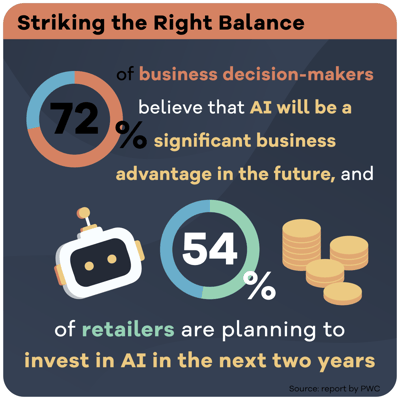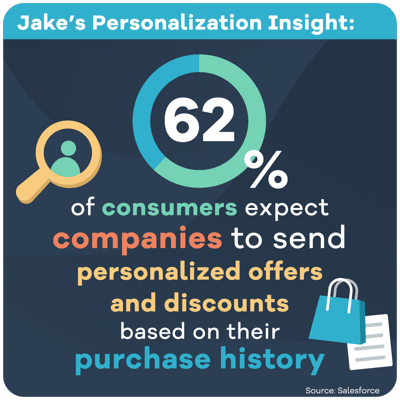In this era of rapid technological advancement and evolving consumer preferences, the retail and consumer goods industry finds itself on the cusp of a significant transformation. Artificial Intelligence (AI) is emerging as a driving force that is reshaping the way brands interact with their customers, particularly in the domains of marketing and branding. In this article, I will explore the dynamic role of AI in personalization, the challenges faced in maintaining brand integrity, and the delicate balance that all stakeholders must strike to thrive in this AI-driven landscape.
The AI Layer: Bridging the Gap
Imagine a world where brands possess an uncanny ability to intimately understand their customers, anticipating their needs and preferences with astonishing accuracy. This vision is progressively materializing, thanks to the AI layer that serves as a bridge between customers and the brands they interact with.
Jake’s AI in Retail Insight: However, according to a report by PwC, 72% of business decision-makers believe that AI will be a significant business advantage in the future, and 54% of retailers are planning to invest in AI in the next two years

Personalization is Key
One of the primary impacts of AI in marketing is personalization. Brands now have the power to tailor their messages, products, and services to meet customers where they are, providing a level of relevance and engagement previously unattainable. Personalization, when executed effectively, leads to increased customer loyalty and higher conversion rates.
Jake’s Personalization Insight: Statistics from Salesforce reveal that 62% of consumers expect companies to send personalized offers and discounts based on their purchase history. AI-driven personalization not only fulfills this expectation but also helps in creating a more memorable and enjoyable shopping experience.

Striking the Right Balance
However, the omnipotence of personalization is accompanied by its unique set of challenges. How much personalization is too much? When does it become intrusive, making customers uncomfortable? These are questions that professionals in the retail and consumer goods industry must grapple with.
Consider the scenario of an AI-powered chatbot. Should it communicate with a young, vibrant customer using colloquial language and a casual tone, knowing they have a penchant for a particular lifestyle? Striking the right balance between personalization and brand integrity is critical. Going too far with personalization can risk alienating customers who may perceive it as intrusive.

Maintaining Brand Integrity in the Age of AI
Brand consistency is at the heart of building trust and loyalty among consumers. In the context of AI, maintaining brand integrity becomes a more complex task. Brands need to ensure that the language they use, the technologies they leverage, and the overall brand architecture align seamlessly with their core messaging.
Consistency Matters
A survey by Nielsen found that 59% of consumers prefer to buy new products from brands they trust. Inconsistencies in brand messaging and personalization can erode that trust. Therefore, it's essential for brands to adopt AI solutions that are in harmony with their established identity.
Ethical Considerations
As AI continues to evolve, ethical considerations come to the forefront. Brands must tread carefully to avoid pitfalls associated with AI, such as biased algorithms or data privacy concerns. A misstep in this regard can result in damage to a brand's reputation and customer trust.

The AI revolution in the retail and consumer goods industry is a double-edged sword. It offers unparalleled opportunities for personalization and customer engagement, but it also demands a delicate balance between personalization and brand integrity. As marketers, it is crucial to harness the power of AI while keeping a watchful eye on ethical considerations and customer perceptions. Striking this balance will define the success of brands in the AI-driven era, ensuring they meet customers where they are while preserving the essence of their brand.
.png?width=56&height=56&name=Jake-01%20(1).png)



